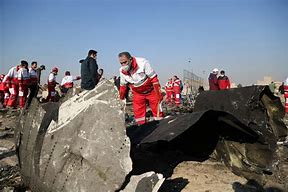June 25, 2021

Iranian authorities have harassed the families of people killed aboard the Ukraine Airlines flight shot down by the Pasdaran in January 2020, Human Rights Watch has charged in a new report.
The group said that from October 2020 to January 2021, it spoke to 31 family members of victims and people with direct knowledge of the authorities’ treatment of the families. They said that Iran’s security agencies had arbitrarily detained, summoned, abusively interrogated, tortured and otherwise mistreated victims’ family members. The agencies also failed to return victims’ possessions to their relatives and interfered with burial and memorial gatherings in an apparent attempt to curtail the demands of the relatives for accountability.
“Iran’s Revolutionary Guard [Pasdaran] killed 176 people without a shred of accountability, and now Iran’s brutal security agencies are abusing victims’ family members to squash any hope for justice,” said Michael Page, deputy Middle East director at Human Rights Watch. “Rather than attempting to regain people’s trust through a transparent investigation and redress for the families, the authorities are again silencing accountability efforts.”
Iranian authorities said that “human error” by a missile operator led to launching two surface-to-air missiles at the plane. But the authorities have not disclosed critical evidence supporting the claim and have not provided any details of their judicial investigation. The Iranian cabinet announced that it had allocated $150,000 to compensate the family of each passenger.
After Iranian authorities admitted they shot down the plane, protests broke out in several Iranian cities. The security forces responded with rubber bullets, pepper spray, and tear gas. Over the past year, courts have sentenced at least 20 people in connection with their participation in protests. At least three more participants are currently on trial, the group said.
In its May 27 report, Human Rights Watch said, “The authorities have also harassed and intimidated victims’ family members. Family members said that in several instances, the authorities interfered with burial and memorial services, pressuring families to accept the government’s ‘martyrdom’ status for their loved ones, and published photos and videos without the permission of the families at services.”
At least 16 people said that security agencies threatened them if they gave interviews to foreign media.
In at least one case, the report said, the authorities tortured a person in custody. In another case, plainclothes officers asked to meet a family member who had spoken against authorities’ conduct at a public place and threatened that person with prosecution. In at least three cases, the authorities threatened family members with “consequences” unless they removed social media posts critical of the government’s lack of accountability.
Several of those interviewed said the authorities returned documents from the victims, but did not return any valuables, such as jewelry and electronic devices.
One family member said that at a private burial when the casket arrived, more than 10 Pasdaran appeared in uniform and carried the body and performed the burial without the family’s consent.
Human Rights Watch said that when families refused, in at least six cases the authorities tried to pressure them to accept the place of burial, particularly in places outside Tehran. In other instances when families opposed calling their loved ones martyrs, they later saw that their graves were designated as such anyway. They said they believed the authorities’ attaching “martyrdom” status was a way for the state to assert control over the process of memorializing victims and to distract people from calls for accountability.